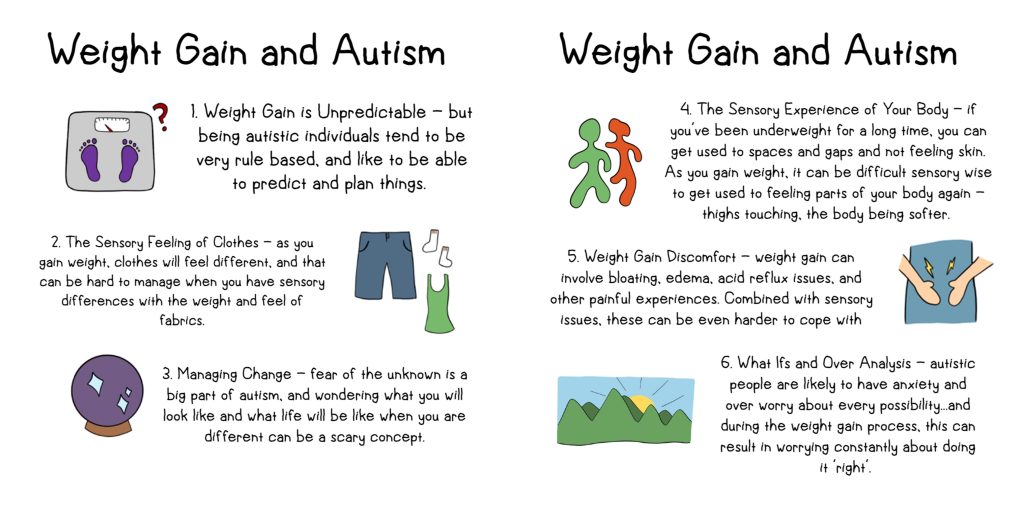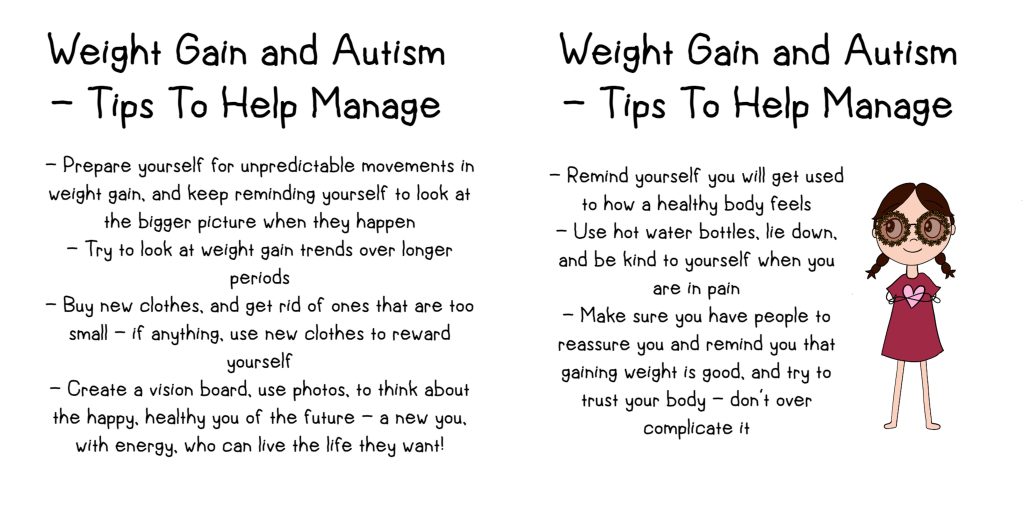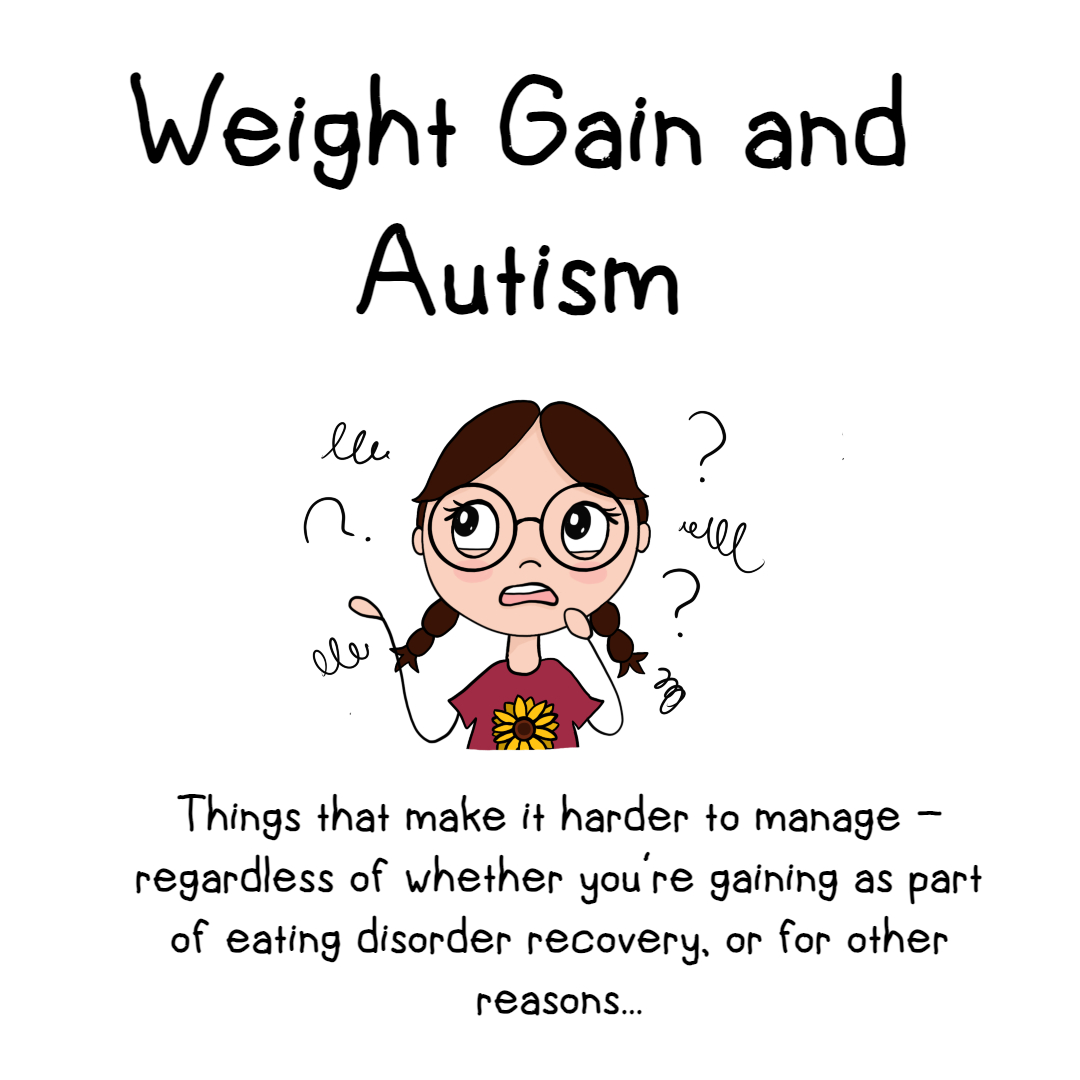In the last couple weeks, I have made a huge number of changes in my routines and habits, in order to turn things around and begin gaining weight. It’s been extremely tough, but I am immensely proud to have put on several kilos, particularly in such a short space of time – this is something I have never achieved before while in the community, at home, on my own (as opposed to being in hospital). Mentally, however, it has been incrediby difficult to cope with, and so I decided to write this blog post to highlight some of the autism related difficuties that can make managing weight gain and the journey of eating disorder recovery more difficult than they already are.

- Weight gain is unpredictable.
Individuals with autism tend to be very rule based, and like to know things in advance – to be able to predict and plan things. The problem with weight gain is that it’s very very UNpredictable. It doesn’t follow rules. Somtimes you can eat a bit less or do a bit more, and gain more weight than the previous day. Sometimes weight jumps up, and sometimes it goes down unexpectedly when you didn’t do anything different..this can lead to confusion, frustration and panic. The unknown is extremely anxiety-provoking, and weight gain can seem like yet another unknown in life to have to contend with. This makes the journey to getting to a healthy weight even more difficult. On days when it does feel overwhelming, I try to look at the bigger picture, think about what weight gain will achieve, and to keep as calm as I can, rather than over analysing. - The sensory feeling of clothes.
I am happy to say that awareness of autistic peoples’ struggle with the feel of fabric seems to be growing, but there’s much more to sensory issues than just this. Growing up, I struggled with heavy and rough fabric, such as denim, as well as the feeling of clothing on my body. I didn’t want to wear anything tight or fitted, because it was so uncomfortable – which ruled out tights, leggings, skinny jeans (and jeans in general). I refused to wear a lot of the clothes my mum bought for me, and whenever possible would put on a baggy top from the boys section of the shop, and loose leggings, or a skirt. As I’ve grown older I’ve been able to manage things better, and I’ve found I can tolerate tights, for example, and I buy denim-look fabric in place of real denim apparel. However, I still tend to opt for very baggy clothing for comfort, and part of weight gain means coping with how different clothing feels on your body. It won’t be so loose, and that might feel uncomfortable. But, clothing is replaceable – your body is not, so that’s the thing you need to be looking after! - Managing change.
When you are autistic, things changing is very stressful. Again, it’s that fear of the unknown. Of course, weight gain means YOU changing. Your body will look different. It will, eventually, feel different too. Depending on how much weight one has to gain, it can feel like becoming a new person, and that can be very scary to think about. What will life be like after weight gain? Who even am I? Autistic individuals also often find their sense of self and identity quite a confusing concept, and because how one looks can play a significant role in one’s identity, your weight changing can be very, very impactful. I try to remember that my current identity, at a low weight, is not what I want, and that by gaining weight, I am going to become the person I want to be – the real Saffron.
- The sensory experience of your body.
I have already mentioned how the sensory feeling of clothing can make weight gain hard, but there’s also the sensory feeling of your own body, which is probably a more overlooked struggle. As you gain weight, your body gets bigger – thighs, if they no longer touched, will touch, gaps and spaces will be filled in. This is important, and necessary, and not only is much more attractive, but also provides cushioning, warmth, and is simply, what a ‘normal’ body needs. However, if you’ve been underweight for an extended period of time, you can get used to not feeling your skin and other body parts. It can feel very uncomfortable and odd when you gain weight, and these sensory experiences return. I really do find this difficult, but I do try to remember that eventually I will get used to these sensory experiences, and that the benefits of weight gain make it worth it. - The pain and uncomfortable feeling as you gain.
Yes – another sensory-related struggle (the last one for today’s post!). The difficulties I have described so far relate to when you have gained a significant amount of weight, but something else that makes weight gain hard is the sensory difficulties of the process of eating more and gaining weight. When you have to gain weight, you have to eat more than your body is used to, and this can involve bloating, indigestion, acid reflux, and numerous other pains and aches, all over the body. Being autistic can make you hyper sensitive to these, because they are all physical sensations within the body, and our sensory perceptions are…a little different! Eating more and getting your body used to more food can be even more painful, and while it’s hard…it isn’t forever. - What ifs, right and wrong and over analysis.
Finally, I want to mention how the autistic tendency to need to consider every single possibility, and the autistic innate sense of justice, can create difficulties as you gain weight. I recently saw a question on Reddit about ‘calculating endless possibilities’ as an autism trait, and like many others, shared how much I related to the person who posted! With anything that happens and any decision I make, I tend to run a million difference trials in my head of what could happen or not happen and what outcomes there could be, even if I know I have no real say, or even if I already know I have a preference. I think this is something common in people with anxiety too, but for me the need to do it seems to transcend all aspects of my life. When we over analyse we also tend to see choices and outcomes as ‘right’ and ‘wrong’ – frequently described as ‘black and white’ thinking. With weight gain, we can over worry about if we’re doing it right, if it’s safe, and this can make the process of weight gain a lot harder to manage. This tendency to over analyse also exaggerates the difficulties of managing any kind of change – will the change be good, bad, right, wrong?
There isn’t a lot I can say about how I manage this, but I think something that has helped me is getting reassurance from others, be that professionals or family and friends, and also reminding myself to trust my body, and trust the process, and that, simply, ‘weight gain is good’. I repeat to myself ‘don’t complicate it, things will be okay’.

Okay, that was longer than I expected, but I hope it gave you some insight – or was relateable – into why weight gain can be more difficult when you’re autistic.
I wanted to finish on a positive note…so above I’ve summarised my advice and tips to help manage.
Look after yourself x

Leave a Reply